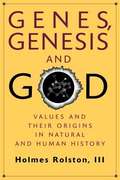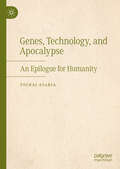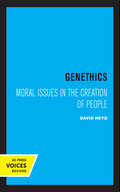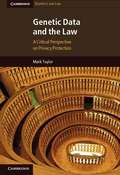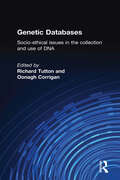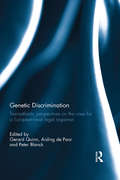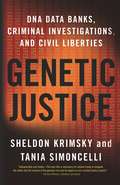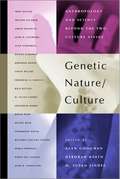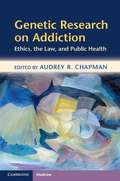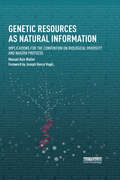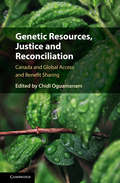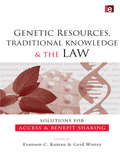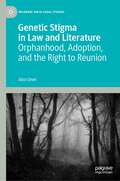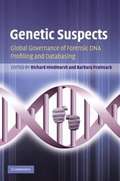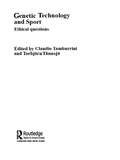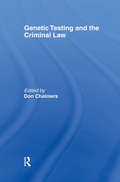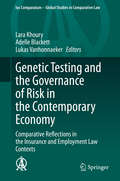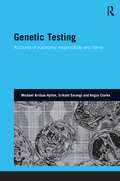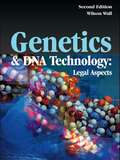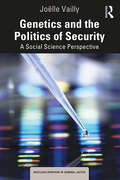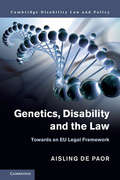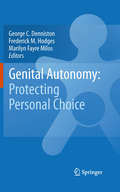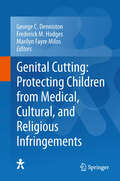- Table View
- List View
Genes, Genesis, and God: Values and Their Origins in Natural and Human History
by Holmes Rolston IIIHolmes Rolston challenges the sociobiological orthodoxy that would naturalize science, ethics, and religion. The book argues that genetic processes are not blind, selfish, and contingent, and that nature is therefore not value-free. The author examines the emergence of complex biodiversity through evolutionary history. Especially remarkable in this narrative is the genesis of human beings with their capacities for science, ethics, and religion. A major conceptual task of the book is to relate cultural genesis to natural genesis. There is also a general account of how values are created and transmitted in both natural and human cultural history. The book is written by one of the most well-respected figures in the philosophy of biology and religion.
Genes, Technology, and Apocalypse: An Epilogue for Humanity
by Yochai AtariaThis book offers a critique of a certain contemporary discourse in popular science that consists of (1) identifying the origins and therefore essential nature of Homo Sapiens; and (2) identifying the nature of technology. The author’s critique is that this double gesture generates a deterministic worldview – man is evil and technology has its own necessity – that operates to exonerate humanity from responsibility to the horrors of the 20th century, epitomized in Auschwitz and Hiroshima, for example. The author situates this operation within what he identifies as an “apocalyptical-eschatological state of mind”. Yochai Ataria explains that the dynamics of technology and the quest for the first human are the two central vectors shaping both scientific and popular discourse today, highlighting the importance of understanding the deep connection between the two.
Genethics: Moral Issues in the Creation of People
by David HeydUnprecedented advances in medicine, genetic engineering, and demographic forecasting raise new questions that strain the categories and assumptions of traditional ethical theories. Heyd's approach resolves many paradoxes in intergenerational justice, while offering a major test case for the profound problems of the limits of ethics and the nature of value. This title is part of UC Press's Voices Revived program, which commemorates University of California Press’s mission to seek out and cultivate the brightest minds and give them voice, reach, and impact. Drawing on a backlist dating to 1893, Voices Revived makes high-quality, peer-reviewed scholarship accessible once again using print-on-demand technology. This title was originally published in 1992.
Genetic Data and the Law
by Mark TaylorResearch using genetic data raises various concerns relating to privacy protection. Many of these concerns can also apply to research that uses other personal data, but not with the same implications for failure. The norms of exclusivity associated with a private life go beyond the current legal concept of personal data to include genetic data that relates to multiple identifiable individuals simultaneously and anonymous data that could be associated with any number of individuals in different, but reasonably foreseeable, contexts. It is the possibilities and implications of association that are significant, and these possibilities can only be assessed if one considers the interpretive potential of data. They are missed if one fixates upon its interpretive pedigree or misunderstands the meaning and significance of identification. This book demonstrates how the public interest in research using genetic data might be reconciled with the public interest in proper privacy protection.
Genetic Databases: Socio-Ethical Issues in the Collection and Use of DNA
by Richard Tutton Oonagh CorriganGenetic Databases offers a timely analysis of the underlying tensions, contradictions and limitations of the current regulatory frameworks for, and policy debates about, genetic databases. Drawing on original empirical research and theoretical debates in the fields of sociology, anthropology and legal studies, the contributors to this book challenge the prevailing orthodoxy of informed consent and explore the relationship between personal privacy and the public good. They also consider the multiple meanings attached to human tissue and the role of public consultations and commercial involvement in the creation and use of genetic databases. The authors argue that policy and regulatory frameworks produce a representation of participation that is often at odds with the experiences and understandings of those taking part. The findings present a serious challenge for public policy to provide mechanisms to safeguard the welfare of individuals participating in genetic databases.
Genetic Discrimination: Transatlantic Perspectives on the Case for a European Level Legal Response
by Peter Blanck Gerard Quinn Aisling De PaorAs genetic technologies advance, genetic testing may well offer the prospect of detecting the onset of future disabilities. Some research also forwards that certain behavioural profiles may have a strong genetic basis, such as the determination to succeed, or the propensity for risk-taking. As this technology becomes more prevalent, there is a danger that genetic information may be misused by third parties and that particular genetic profiles may be discriminated against by employers, by providers of social goods and services, such as insurance companies and even by educational facilities. This book explores the different forms and potential uses of genetic testing. Drawing together leading experts in disability law, bioethics, health law and a range of related fields, it highlights the ethical and legal challenges arising as a result of emerging and rapidly advancing genetic science. On examining transatlantic perspectives on the matter, chapters in the book ask whether the US Genetic Information Nondiscrimination Act (GINA) is proving to be an effective tool in addressing the issue of genetic discrimination and alleviating fears of discrimination. The book also reviews what insights may be gained from GINA within employment and health insurance contexts, and asks how the UN Convention on the Rights of Persons with Disabilities (CRPD) may impact similar debates within the European Union. The book focuses particularly on the legislative and policy framework in the European Union, with an emphasis on the gaps in protection and the scope for specific legislative action in this area. This book will be of great interest to scholars and students of discrimination law, bioethics and disability law, and will be of considerable use to legal practitioners, medical practitioners and policy-makers in this area.
Genetic Justice: DNA Data Banks, Criminal Investigations, and Civil Liberties
by Sheldon Krimsky Tania SimoncelliNational DNA databanks were initially established to catalogue the identities of violent criminals and sex offenders. However, since the mid-1990s, forensic DNA databanks have expanded in some states and nations to include all people who have been arrested, regardless of whether they've been charged or convicted of a crime. The public is largely unaware of these changes and the advances in biotechnology and forensic DNA science that have made them possible, but we are beginning to realize that the unfettered collection of DNA profiles from innocent citizens has compromised our basic freedoms and rights. Two prominent advisors on medical ethics, science policy, and civil liberties take a hard look at how the United States, Australia, Japan, and European countries have balanced the use of DNA databanks in criminal justice with the privacy rights of their citizenry. Sheldon Krimsky and Tania Simoncelli analyze the constitutional, ethical, and sociopolitical implications of expanded DNA collection in the United States and compare these findings to trends in other locations. They examine the development of legal precedent for taking DNA from juveniles, searching DNA databases for possible family members of suspects, conducting "DNA dragnets" of large local populations, and the warrantless acquisition by police of so-called abandoned DNA as they search for suspects. Most intriguing, Krimsky and Simoncelli explode the myth that DNA profiling is infallible, which has profound implications for criminal justice.
Genetic Justice: DNA Data Banks, Criminal Investigations, and Civil Liberties
by Sheldon Krimsky Tania SimoncelliNational DNA databanks were initially established to catalogue the identities of violent criminals and sex offenders. However, since the mid-1990s, forensic DNA databanks have in some cases expanded to include people merely arrested, regardless of whether they've been charged or convicted of a crime. The public is largely unaware of these changes and the advances that biotechnology and forensic DNA science have made possible. Yet many citizens are beginning to realize that the unfettered collection of DNA profiles might compromise our basic freedoms and rights.Two leading authors on medical ethics, science policy, and civil liberties take a hard look at how the United States has balanced the use of DNA technology, particularly the use of DNA databanks in criminal justice, with the privacy rights of its citizenry. Krimsky and Simoncelli analyze the constitutional, ethical, and sociopolitical implications of expanded DNA collection in the United States and compare these findings to trends in the United Kingdom, Japan, Australia, Germany, and Italy. They explore many controversial topics, including the legal precedent for taking DNA from juveniles, the search for possible family members of suspects in DNA databases, the launch of "DNA dragnets" among local populations, and the warrantless acquisition by police of so-called abandoned DNA in the search for suspects. Most intriguing, Krimsky and Simoncelli explode the myth that DNA profiling is infallible, which has profound implications for criminal justice.
Genetic Nature / Culture: Anthropology and Science Beyond the Two-Culture Divide
by Alan H. Goodman Deborah Heath M. Susan LindeeThis volume of original scholarship focuses on how anthropology is affected by and should respond to the wide range of issues associated with the culture and practice of genetics.
Genetic Research on Addiction
by Audrey R. ChapmanThe manner in which genetic research associated with addiction is conducted, interpreted and translated into clinical practice and policy initiatives raises important social, ethical and legal issues. Genetic Research on Addiction fulfils two key aims; the first is to identify the ethical issues and requirements arising when carrying out genetically-based addiction research, and the second is to explore the ethical, legal and public policy implications of interpreting, translating and applying this research. The book describes research guidelines on human protection issues such as improving the informed consent process, protecting privacy, responsibilities to minors and determining whether to accept industry funding. The broader public health policy implications of the research are explored and guidelines offered for developing effective social interventions. Highly relevant for clinicians, researchers, academics and policy-makers in the fields of addiction, mental health and public policy.
Genetic Resources as Natural Information: Implications for the Convention on Biological Diversity and Nagoya Protocol (Routledge Studies in Law and Sustainable Development)
by Manuel Ruiz MullerDemonstrating the shortcomings of current policy and legal approaches to access and benefit-sharing (ABS) in the Convention on Biological Diversity (CBD), this book recognizes that genetic resources are widely distributed across countries and that bilateral contracts undermine fairness and equity. The book offers a practical and feasible regulatory alternative to ensure the goal of fairness and equity is effectively and efficiently met. Through a legal analysis that also incorporates historic, economic and sociological perspectives, the book argues that genetic resources are not tangible resources but information. It shows that the existing preference for bilateralism and contracts reflects resistance on the part of many of the stakeholders involved in the CBD process to recognize them as such. ABS issues respond very well to the economics of information, yet as the author explains, these have been either sidelined or overlooked. At a time when the Nagoya Protocol on ABS has renewed interest in feasible policy options, the author provides a constructive and provocative critique. The institutional, policy and regulatory framework constitute "bounded openness" under which fairness and equity emerge.
Genetic Resources, Justice and Reconciliation: Canada and Global Access and Benefit Sharing
by Chidi OguamanamWhen the oral history of a medicinal plant as a genetic resource is used to develop a blockbuster drug, how is the contribution of indigenous peoples recognized in research and commercialization? What other ethical, legal, and policy issues come into play? Is it accurate for countries to self-identify as users or providers of genetic resources? This edited collection, which focuses on Canada, is the result of research conducted in partnership with indigenous peoples in that country, where melting permafrost and new sea lanes have opened the region's biodiversity, underscoring Canada's status as a user and provider of genetic resources and associated indigenous knowledge. This work is an important resource for scholars, corporations, indigenous peoples, policymakers, and concerned citizens as Canada and other countries take on the implementation of Access and Benefit Sharing policies over genetic resources and associated indigenous knowledge. This book is also available as Open Access.
Genetic Resources, Traditional Knowledge and the Law: Solutions for Access and Benefit Sharing
by Gerd Winter Evanson C. KamauThe need to regulate access to genetic resources and ensure a fair and equitable sharing of any resulting benefits was at the core of the development of the Convention on Biological Diversity (CBD). The CBD established a series of principles and requirements around access and benefit sharing (ABS) in order to increase transparency and equity in the international flow of genetic resources, yet few countries have been able to effectively implement them and ABS negotiations are often paralysed by differing interests. This book not only examines these complex challenges, but offers workable, policy-oriented solutions. International contributors cover theoretical approaches, new significant national legislation, the concept of traditional knowledge, provider and user country measures and common solutions. Exploring specific, salient examples from across the globe, the authors provide lessons for national regulation and the ongoing negotiations for an international ABS regime. Uniquely, this book also looks at the potential for 'horizontal' development of ABS law and policy, applying lessons from bilateral approaches to other national contexts.
Genetic Stigma in Law and Literature: Orphanhood, Adoption, and the Right to Reunion (Palgrave Socio-Legal Studies)
by Alice DiverThis book critically analyses the way in which traditional sociocultural and legal biases might be perpetuated against those with unknown – or unknowable – genetic ancestries. It looks to law and works of literature across differing eras and genres focussing upon such concepts as inherited stigma, illegitimacy, orphanisation, adoption, othering, reunion, and the ‘right’ to access truths that relate to one’s original identity. Law’s role in such matters is often limited (or usurped) by custom, practice, or lingering superstitious beliefs; the importance of oral and written testimony is therefore highlighted. Characters include abandoned or orphaned figures from folk and fairy tales, Romantic and Victorian monsters and heroes, Dickensian waifs, Edwardian rescue orphans, and dystopia-set ‘rebels.‘ Their insights and experiences are mirrored in various present day scenarios that speak to familial human rights abuses, not least forced adoptions and bars on accessing original information. This cross-disciplinary book drawing on Law, Literature, Sociology, Critical Adoption Studies should be of interest to those interested in and those who have been affected in some way by adoption, origin deprivation, or reunion.
Genetic Suspects: Global Governance of Forensic DNA Profiling and Databasing
by Richard Hindmarsh Barbara PrainsackAs DNA forensic profiling and databasing become established as key technologies in the toolbox of the forensic sciences, their expanding use raises important issues that promise to touch everyone's lives. In an authoritative global investigation of a diverse range of countries, including those at the forefront of these technologies' development and use, this book identifies and provides critical reflection upon the many issues of privacy; distributive justice; DNA information system ownership; biosurveillance; function creep; the reliability of collection, storage and analysis of DNA profiles; the possibility of transferring medical DNA information to forensics databases; and democratic involvement and transparency in governance, an emergent key theme. This book is timely and significant in providing the essential background and discussion of the ethical, legal and societal dimensions for academics, practitioners, public interest and criminal justice organisations, and students of the life sciences, law, politics, and sociology.
Genetic Technology and Sport: Ethical Questions (Ethics and Sport)
by Torbjörn Tännsjö Claudio TamburriniWill the genetic design of athletes destroy sport … or will it lead to a new and extraordinary age of athletic achievement? Exploring a new territory in sport and ethics, this edited collection contains some of the best new writing that has emerged from the debates concerning the uses of genetic technologies to improve sport performance. Issues covered include: * gene technology and sports ethics* genetic testing in sports* gene technology and the sporting ethos* gene technology and gender equality in sport. This cutting-edge text is the first on the subject to analyze gender specific questions that arise from genetically modified sport and is likely to provoke further debate in the world of sport and bio-ethics. Contributors include Lincoln Allison, Ruth Chadwick, Arne Ljungqvist, Andy Miah, Christian Munthe, Bengt Saltin, Angela Schnieder and many more.
Genetic Testing and the Criminal Law
by Don ChalmersGenetic Testing and the Criminal Law is a unique international treatment of the dynamic and established criminal investigation technique of DNA testing. Gathering together expert practitioners, judges and researchers from twelve countries, each chapter deals with the specific criminal law of the jurisdiction in its interaction with the expanding use of DNA testing in criminal investigations and trials. The chapters cover the criminal law of the United Kingdom, Japan, Australia, Germany, New Zealand, Spain, South Africa, Canada, Italy, Finland, Argentina and Denmark, providing valuable accounts not only of the use of genetic testing in the criminal law, but also of the development of the law in these jurisdictions. No previous work has included such an extensive comparative study in this important area. Collectively, this book emphasizes the need for the law to respond to scientific developments thoughtfully and with a sensitive, well-reasoned approach to current concerns relating to the reliability of DNA evidence in criminal trials and the privacy and civil liberties issues surrounding the collection of DNA samples from individuals and their storage. This book is an invaluable reference for scholars, practitioners of criminal law and private international law, and students interested in this increasingly significant field of law.
Genetic Testing and the Governance of Risk in the Contemporary Economy: Comparative Reflections in the Insurance and Employment Law Contexts (Ius Comparatum - Global Studies in Comparative Law #34)
by Lara Khoury Adelle Blackett Lukas VanhonnaekerThis book addresses emerging questions concerning who should bear responsibility for shouldering risk, as well as the viability of existing and experimental governance mechanisms in connection with new technologies. Scholars from 14 jurisdictions unite their efforts in this edited collection to provide a comparative analysis of how various legal systems are tackling the challenges produced by the legal aspects of genetic testing in insurance and employment. They cover the diverse set of norms that surround this issue, and share insights into relevant international, regional and national incursions into the field. By doing so, the authors offer a basis for comparative reflection, including on whether transnational standard setting might be useful or necessary for the legal aspects of genetic testing as they relate to the insurance and employment contexts. The respective texts cover a broad range of topics, including the prevalence of genetic testing in the contexts of insurance and employment, and policy factors that might affect this prevalence, such as the design of national health or social insurance systems, of private insurance schemes or the availability of low-cost direct-to-consumer genetic testing. Further, the field of genetics is gaining in importance at the international and regional levels. Relevant concepts – mainly genetic tests and genetic data/information – have been internationally defined, and these definitions have influenced definitions adopted nationally. International law also recognizes a “special status” for human genetic data. The authors therefore also consider these definitions and the recognition of the special status of human genetic data within regional and national legal orders. They investigate the range of norms that specifically address the use of genetic testing in employment and insurance, encompassing international sources – including human rights norms – that may be binding or non-binding, as well national statutory, regulatory and soft-law mechanisms. Accordingly, some of the texts examine general frameworks relevant to genetic testing in each country, including those that stem from general anti-discrimination rules and norms protecting rights to autonomy, self-determination, confidentiality and privacy. In closing, the authors provide an overview of the efficiency of their respective legal regimes’ approaches – specific and generalist – to genetic testing or disclosure of genetic information in the employment or insurance contexts, including the effect of lack of legal guidance. In this regard, some of the authors highlight the need for transnational action in the field and make recommendation for future legal developments.
Genetic Testing: Accounts of Autonomy, Responsibility and Blame (Genetics and Society)
by Srikant Sarangi Michael Arribas-Ayllon Angus ClarkeAdvances in molecular genetics have led to the increasing availability of genetic testing for a variety of inherited disorders. While this new knowledge presents many obvious health benefits to prospective individuals and their families it also raises complex ethical and moral dilemmas for families as well as genetic professionals. This book explores the ways in which genetic testing generates not only probabilities of potential futures, but also enjoys new forms of social, individual and professional responsibility. Concerns about confidentiality and informed consent involving children, the assessment of competence and maturity, the ability to engage in shared decision-making through acts of disclosure and choice, are just some of the issues that are examined in detail.
Genetics and DNA Technology: Legal Aspects
by Wilson WallFirst published in 2005. Routledge is an imprint of Taylor & Francis, an informa company.
Genetics and the Politics of Security: A Social Science Perspective (Routledge Frontiers of Criminal Justice)
by Joëlle VaillyPresenting a social science perspective on the contemporary gaze on the body of the suspect, this book considers how definitions of criminality, offenses, individual rights, and the concepts of identity and difference have been altered by changes in the biological status of the human.Spurred by rapid developments in genetics and information technology, a number of countries, including France, the United States, the United Kingdom, China, and the Netherlands, have considerably expanded their genetic databases used by the police and the criminal justice system. Whilst this makes it possible to compare DNA left at the scene of a crime with that of an individual known to the police, helping to identify individuals for the purposes of court proceedings, these innovations also raise a number of important questions, such as how the relationship between respect for the rights of individuals and the security of populations is discussed, as well as for how long this data should be retained. Genetic analysis also raises concerns related to phenotyping and “biogeographical origin” that could lead to the stigmatization of targeted groups.Offering a comprehensively argued view on how DNA acts not only as a tracker of suspicion but also as a marker of contemporary social developments, Genetics and the Politics of Security will appeal to students and scholars, judiciary personnel, lawyers, police officers, and people with an interest in criminology and the use of genetics in the criminal justice process.
Genetics, Disability and the Law: Towards an EU Legal Framework (Cambridge Disability Law and Policy Series)
by Aisling De PaorWhile advances in science and technology bring many advantages, we must not ignore the harm that they can cause. Rapid changes in genetic testing are a prime example, and indicators can now help to detect, address and treat diseases. However, in this new study, Aisling de Paor examines how genetic testing is also being used for non-medical reasons, for example for work opportunities and insurance coverage. Genetics, Disability and the Law is the first book of its kind to substantively consider an EU-level response to the use of genetic information. de Paor discusses how to help genetic and scientific research to evolve and grow, how to enhance public confidence in research, and how to control it so that it recognises our values and fundamental human rights. An understudied but vitally important topic, de Paor's work provides a valuable and timely contribution to the field of disability rights. Presents a practical consideration of an EU-level legislative response to controlling the use and misuse of genetic information, appealing to those involved in the regulation of this field Takes a human rights and disability approach to considering the regulation of genetic information, which will interest scholars and policymakers from a variety of disciplines, in particular because it considers the intersection of disability and genetics Considers normative and non-normative attitudes to the regulation of genetic information, giving readers a new and varied insight
Genital Autonomy:
by Frederick M. Hodges Marilyn Fayre Milos George C. DennistonCircumcision affects 15.3 million children and young adults annually. In terms of gender, 13.3 million boys and 2 million girls are subjected to the involuntary removal of part or all of their external sexual organs every year. The problem of female circumcision has been addressed on an international level, but male circumcision remains a controversial subject that many academics have been reluctant to examine. Circumcision is tolerated today because it has been practiced for millennia by a small but vocal minority of religious and ethnic groups, however, when the practice is examined through the lens of modern legal, ethical, and human rights advancements, no place remains in civilized society for this body-altering ritual. In Genital Autonomy: Protecting Personal Choice, international experts address various types of genital modifications, the impact of these harmful traditional practices on the child, on human rights, and on the development of the concept of bodily integrity. The papers presented in this volume address these topics from a variety of angles. They question and dissects the true motivations of the doctors, witch doctors, and "holy men" who promote and profit from circumcision.
Genital Cutting: Protecting Children from Medical, Cultural, and Religious Infringements
by Frederick M. Hodges Marilyn Fayre Milos George C. DennistonThis volume contains the proceedings of the 10th International Symposium on Circumcision, Genital Integrity, and Human Rights. Authors are international experts in their fields, and the book contains the most up-to-date information on the issue of genital cutting of infants and children from medical, legal, bioethical, and human rights perspectives.
Genocidal Crimes
by Alex AlvarezGenocide has emerged as one of the leading problems of the twentieth century. No corner of the world seems immune from this form of collective violence. While many individuals are familiar with the term, few people have a clear understanding of what genocide is and how it is carried out. This book clearly discusses the concept of genocide and dispels the widely held misconceptions about how these crimes occur and the mechanisms necessary for its perpetration. Genocidal Crimes differs from much of the writing on the subject in that it explicitly relies upon the criminological literature to explain the nature and functioning of genocide. Criminology, with its focus on various types of criminality and violence, has much to offer in terms of explaining the origins, dynamics, and facilitators of this particular form of collective violence. Through application of a number of criminological theories to various elements of genocide Alex Alvarez presents a comprehensive analysis of this particular crime. These criminological perspectives are underpinned by a variety of psychological, sociological, and political science based insights in order to present a more complete discussion of the nature and functioning of genocide.
